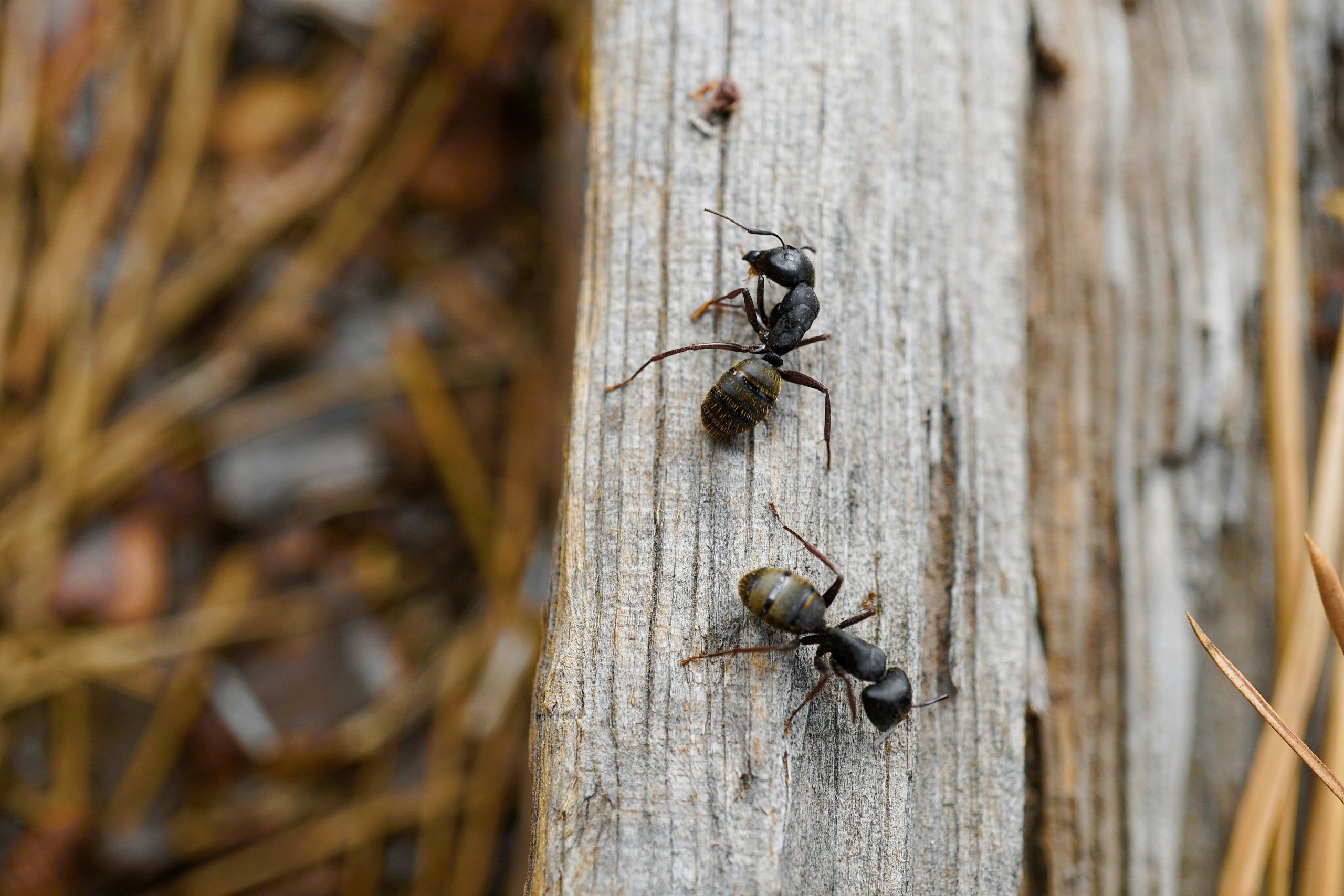Ant infestations can be a significant nuisance in any household, leading to the search for effective solutions to control and eliminate these persistent pests. Among the various methods available, ant spray is often a go-to choice for many homeowners. But is ant spray truly effective, and what should you know about using it around your home, especially concerning safety for pets and family?
In this blog post, we’ll cover everything you need to know about ant spray, examining its efficacy, safety, and best practices for use.
What is Ant Killer Spray?
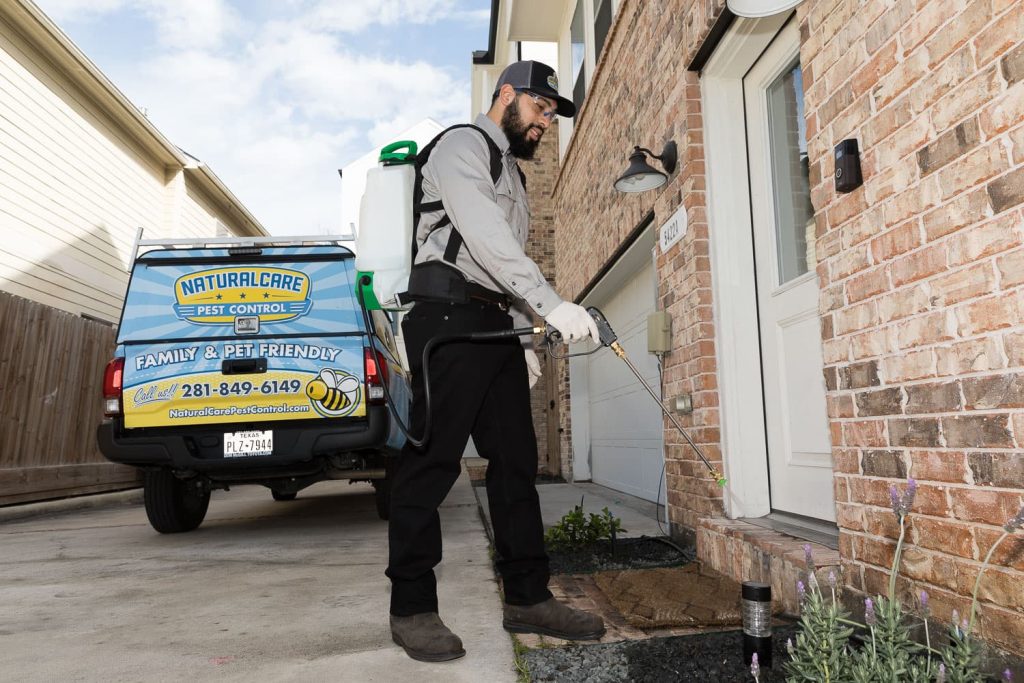
Ant killer spray is a chemical solution designed to kill ants on contact or when ingested. It’s formulated to target ants’ nervous systems, leading to rapid extermination. These sprays come in various types, catering to different needs, such as indoor ant spray and outdoor ant spray, ensuring there’s a solution for every scenario.
How Does Ant Spray Work?
Ant sprays work by delivering a potent chemical that either kills ants on contact or acts as a delayed toxin that ants carry back to their colony, affecting other members. This makes ant spray a versatile tool in both immediate ant removal and long-term colony management.
Is Ant Spray Effective?
The effectiveness of ants spray depends on the application and the specific ant problem you’re dealing with. For isolated issues or direct application on visible ants, ant spray can provide quick relief. However, for more extensive infestations, especially those involving hidden nests, additional pest control methods may be necessary.
Is Ant Spray Safe for Pets?

Safety is a primary concern when using ant spray in a home with pets. While many ant sprays claim to be pet safe ant sprays, it’s important to read labels carefully and choose products specifically marked as non-toxic or safe for pets.
How Long Does Ant Spray Stay Good?
The efficacy of ant spray over time can vary. Most commercially available ant killer sprays offer residual effects that can last from days to weeks, ensuring protection beyond the initial application.
How to Safely Store Ant Spray
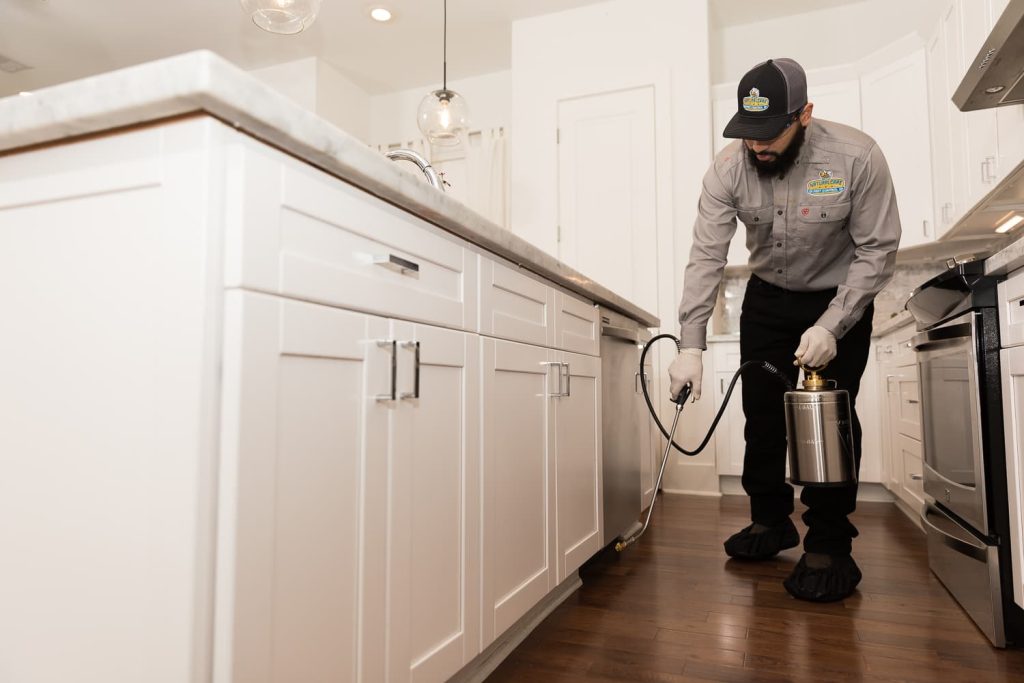
Proper storage of ant spray is crucial to ensure the safety of your household and the effectiveness of the product. Incorrect storage can lead to accidental exposure, degradation of the spray, and potential hazards. Follow these steps and tips to store your ant spray safely:
- Read the Label: Before storing, always read the product label for specific storage instructions provided by the manufacturer. Some products may require special storage conditions.
- Choose the Right Location: Store ant spray in a cool, dry place to prevent the formula from degrading. High temperatures or direct sunlight can cause the container to degrade or the contents to become less effective.
- Keep It Out of Reach: Store the ant spray out of reach of children and pets. High shelves in locked cabinets or closets are ideal storage spots.
- Use Original Packaging: Keep the ant spray in its original container with the label intact. This ensures that you and others can always refer back to the usage and safety instructions.
- Secure the Cap: After each use, make sure the cap is securely fastened to prevent leaks. Check the nozzle to ensure it’s in the “off” position to avoid accidental discharge.
- Avoid Extreme Conditions: Do not store ant spray in places where it can be exposed to extreme temperatures, such as near heaters, in cars, or in unconditioned attics or garages.
- Separate from Food and Drink: Never store ant spray near food, utensils, or anywhere it could contaminate consumables. Chemicals from the spray could inadvertently transfer to these items.
- Monitor for Damage: Periodically check the storage container for signs of damage or leaks. If it is compromised, dispose of the ant sprayer containers according to local regulations.
- Ventilate Storage Area: If possible, choose a storage area with good ventilation. This helps to dissipate any fumes that may leak from the container, reducing the risk of inhalation.
- Follow Disposal Instructions: When the ant spray is no longer needed or has expired, follow the disposal instructions on the product label. Many areas have specific guidelines for disposing of chemical products to protect the environment.
How to Use Ant Spray
To ensure that you use ant spray both safely and effectively, it’s essential to follow a set of best practices. Here’s a comprehensive ant removal guide to help you achieve maximum efficiency while minimizing risks to your health and the environment:
Read the Product Label Thoroughly
Before using any ant spray, carefully read the product label. The label contains vital information on how to use the product safely, the types of ants it targets, and the recommended areas of application.
Wear Protective Gear

Protect yourself by wearing gloves and, if recommended by the product label, eye protection or a mask. This is especially important if you’re spraying in confined spaces where you might inhale the spray or get it on your skin.
Ventilate the Area
If using ant spray indoors, ensure the area is well-ventilated. Open windows and doors to allow fresh air to circulate and reduce the concentration of the spray in the air.
Target Specific Areas
Focus on spraying areas where you’ve seen ant activity or where ants are likely to enter your home. This includes entry points like windows, doors, and cracks in the foundation, as well as trails and nests.
Spray from a Safe Distance

Hold the spray can at the distance recommended on the label, usually about 8 to 12 inches from the target surface. This helps ensure the spray is evenly distributed and prevents you from inhaling it.
Avoid Over-Application
Apply the ant spray according to the manufacturer’s instructions—more isn’t always better. Over-application can increase health risks and may not be more effective against ants.
Keep Away from Food and Pets
Ensure that food, dishes, and utensils are covered or removed from the area before spraying. Keep pets away from treated areas until the spray has dried and the area has been ventilated.
Do Not Spray Directly on Plants
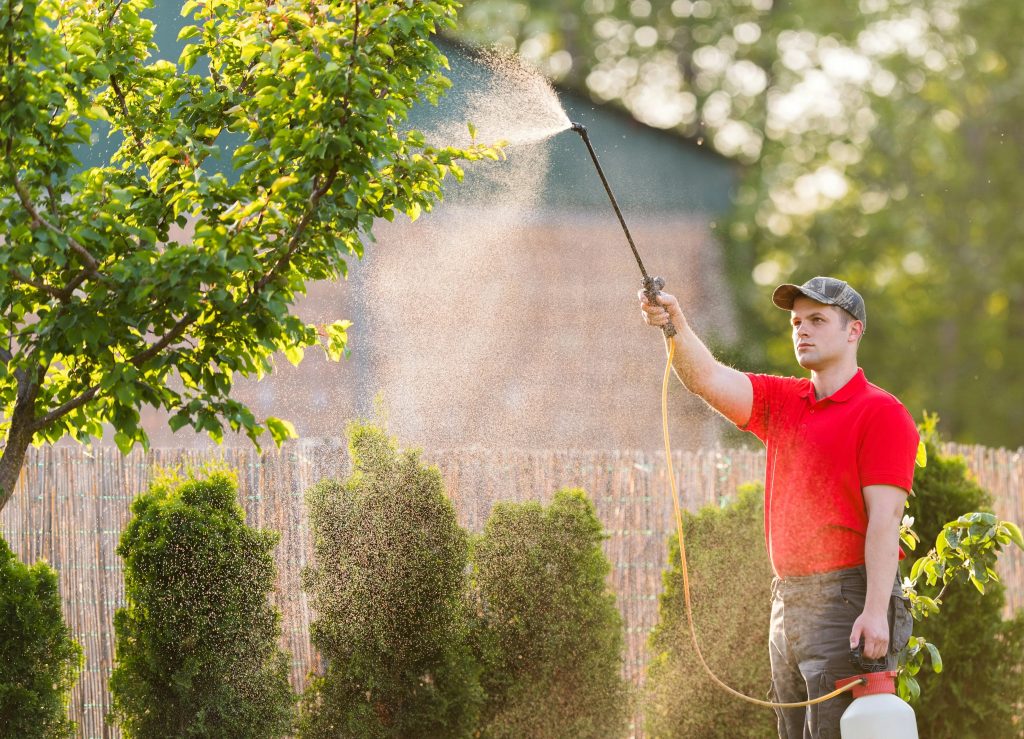
Some ant sprays may harm plants. If you need to treat areas around plants, spray the soil or pot, avoiding direct contact with the plant itself.
Wipe Away Excess
After spraying, wipe away any excess product from non-target surfaces, especially those that come into contact with food or children’s toys.
Store Properly After Use
Once you’re finished, ensure the spray can is securely closed and store it in a safe place, out of reach of children and pets, and away from extreme temperatures.
Dispose of Empty Containers Correctly
Follow local regulations and the manufacturer’s instructions for disposing of empty ant spray containers. Do not puncture or incinerate aerosol cans.
Best Ant Sprays for Your Home
Discover the top ant sprays available to ensure your home remains an ant-free zone. These sprays combine effectiveness with safety for both indoor and outdoor use.
Best Indoor Ant Spray

When it comes to keeping your home free from ants, selecting the right ant spray is crucial. For indoor environments, the priority is finding a product that not only effectively eliminates ants but also ensures the safety of humans and pets residing in the space.
Here are some top recommendations for indoor ant sprays available in the USA, renowned for their efficacy and safety profile:
Eco Defense Organic Home Pest Control Spray
This ant spray is made from natural, organic ingredients, making it safe for use around children and pets. It’s effective against a wide range of insects, including ants, without leaving behind harmful residues.
MDXconcepts Organic Home Pest Control Spray
Another eco-friendly option, this spray uses natural ingredients like peppermint oil to repel and kill ants. It’s non-toxic and safe for use in kitchens and other areas where food is prepared or stored.
Wondercide Natural Indoor Pest Control Spray
Formulated with natural essential oils, this spray is effective against ants and other common household pests. It’s safe to use around children and pets and can be sprayed directly on furniture, carpets, and bedding without fear of toxic residues.
Raid Ant and Roach Killer Lemon Scent
For those who prefer a product from a well-known brand, Raid’s Ant and Roach Killer is available in a lemon scent that’s less harsh than traditional chemical sprays. While it’s effective at killing ants on contact, it’s recommended to use it cautiously around pets and to follow the label instructions carefully.
Ortho Home Defense Max Indoor Insect Barrier
Offering long-lasting protection, this product creates an invisible barrier that kills ants and prevents new ones from entering your home. It’s designed to be odorless and dries fast, making it less intrusive to your living space.
Best Outdoor Ant Spray
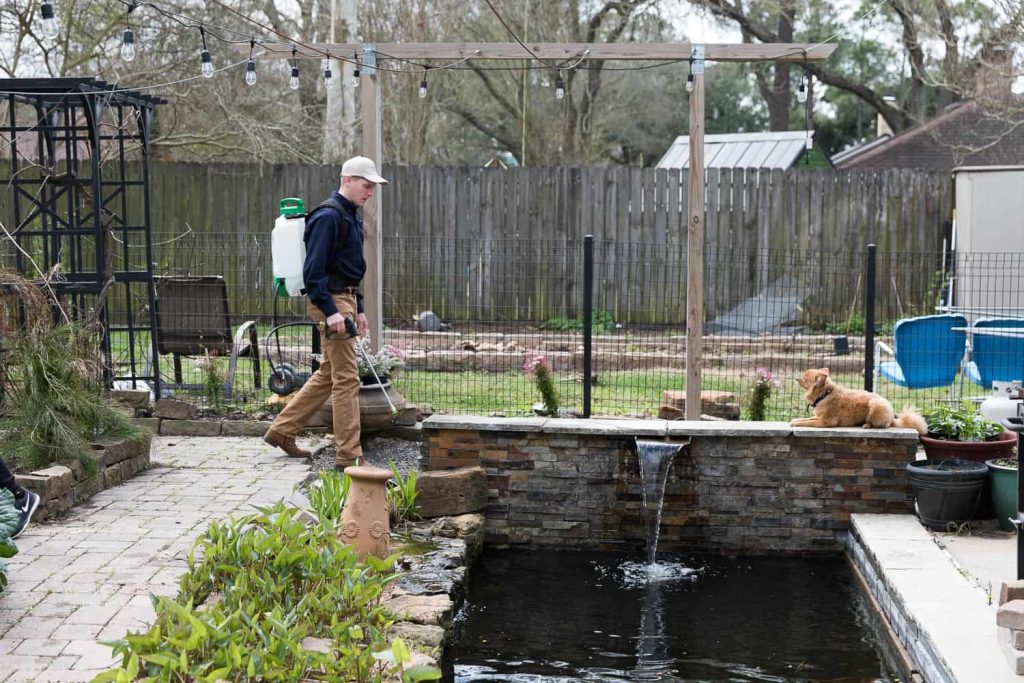
Effective management of outdoor ant populations not only requires a potent ant spray for yards but also one that can withstand the elements to provide long-lasting protection. Here are several top choices for outdoor spray for ants outside available in the USA, designed to meet these needs:
Terro Outdoor Ant Killer Spray
Terro is renowned for its effective ant control solutions, and their outdoor ant killer spray is no exception. It provides a protective barrier that is waterproof, ensuring that rain doesn’t wash it away. Suitable for creating a perimeter around your home, it’s effective against various ant species.
Spectracide Triazicide Insect Killer for Lawns & Landscapes Concentrate
This powerful solution not only targets ants but a wide range of outdoor pests. It’s designed to be mixed with water and applied with a sprayer, offering protection over a large area. Its formula is resilient against rain, providing long-term pest control.
Ortho Home Defense Insect Killer for Lawn & Landscape
Ortho’s product is formulated to not only kill ants on contact but also to create a long-lasting barrier around your home’s exterior. It’s effective against a variety of insects and is designed to be water-resistant, ensuring it remains effective after rainfall.
Bayer Advanced Complete Insect Killer for Soil & Turf
This two-way formula kills ants and other pests on the surface and below the ground. It offers up to three months of protection, making it an excellent choice for season-long pest control. It’s also rainproof, ensuring its effectiveness is maintained through wet conditions.
AMDRO Quick Kill Lawn & Landscape Insect Killer
AMDRO’s Quick Kill formula works on contact to eliminate ants and other pests from your lawn and garden. It creates a barrier that’s effective for up to three months and is rainproof 24 hours after application, making it a reliable choice for outdoor ant control.
Best Pet Safe Ant Spray

For households with pets, choosing a pet friendly ant spray is essential to ensure the well-being of all furry family members. These sprays are formulated with non-toxic ingredients that are effective against ants but safe for animals. Here are some of the best pet-friendly ant sprays available in the USA:
EcoSMART Organic Ant and Roach Killer
EcoSMART’s products are known for their natural, plant-based formulas. This ant and roach killer is made with essential oils, including peppermint, which is effective against pests but safe for pets and children.
Wondercide EcoTreat Natural Outdoor Pest Control Spray
Wondercide offers a versatile outdoor pest control solution that’s safe for pets, even if they roam the yard immediately after application. It can be used around patios, lawns, and gardens to eliminate ants and other pests without harsh chemicals.
Orange Guard Home Pest Control
Derived from orange peel extract, Orange Guard is a water-based indoor and outdoor insecticide that’s safe to use around food, humans, and pets. It kills ants on contact and can be used as a preventative treatment around the home.
MDXconcepts Organic Home Pest Control Spray
Safe for pets and kids, this spray uses natural ingredients like peppermint oil to effectively repel and kill ants indoors. It’s non-toxic and can be used in the kitchen, around pet bedding, and other areas where pets frequent.
Vet’s Best Flea and Tick Home Spray
While designed for fleas and ticks, this product’s natural ingredients, including peppermint oil and eugenol from clove plants, also make it effective against ants. It’s safe to apply on pet bedding, carpets, and other areas inside your home.
Best Non Toxic Ant Spray
Non-toxic ant sprays are an ideal choice for individuals prioritizing safety for their family, pets, and the environment while combating ant infestations. These sprays typically utilize natural ingredients to effectively deter and eliminate ants without the use of harsh chemicals. Here are some top non-toxic ant spray options available in the USA:
EcoRaider Ant & Crawling Insect Killer
Recognized for its effectiveness and safety, EcoRaider’s ant killer is made from natural and organic ingredients. It’s a fast-acting formula that not only kills ants on contact but also disrupts their trails, preventing future infestations.
Mighty Mint Peppermint Oil Insect & Pest Control Spray
Mighty Mint’s spray harnesses the power of peppermint essential oil, a natural insect repellent. Safe for use in homes, it’s particularly effective against ants and other crawling pests, and it offers a refreshing scent as an added bonus.
Plant Therapy Nature Shield Synergy Essential Oil Blend
While not marketed solely as an ant spray, this blend of essential oils can be diluted with water and sprayed around the home to create a natural barrier against ants. Ingredients include citronella, eucalyptus, and lemongrass, known for their pest-repelling properties.
Dr. Earth Final Stop Yard & Garden Insect Killer Spray
This spray is designed for both indoor and outdoor use. It utilizes a blend of essential oils to kill and repel ants safely. It’s environmentally friendly and safe around children and pets, making it a great choice for gardens and yards.
Aunt Fannie’s Ant Remedy
Specifically formulated to tackle ant problems, Aunt Fannie’s Ant Remedy uses a blend of essential oils, including clove and peppermint, to safely and effectively eliminate ants. It’s a non-toxic spray that can be used around food surfaces, making it ideal for kitchens.
Alternative Types of Ant Repellent
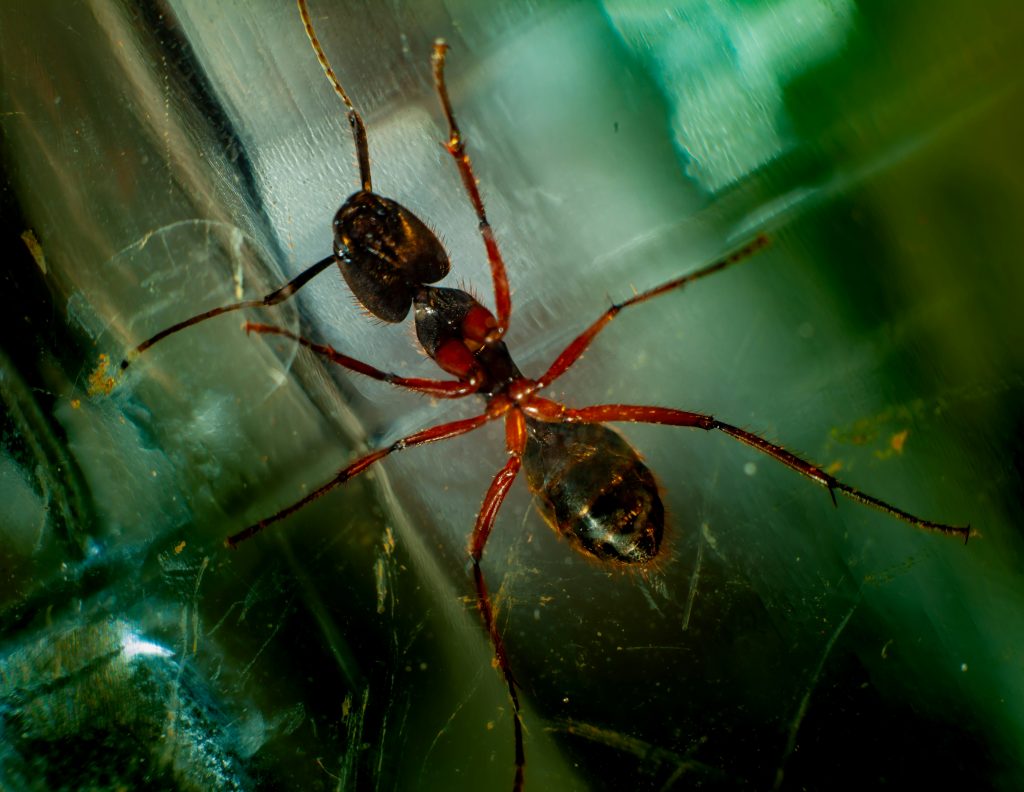
While ant and roach sprays are a popular choice for immediate action against ants and roaches, a well-rounded ant control strategy often incorporates various types of repellents and treatments to tackle the problem from multiple angles. Here’s a closer look at alternative ant repellent methods that can be effective components of your pest control arsenal:
Diatomaceous Earth (Silicon Dioxide)
Diatomaceous earth (DE) is a naturally occurring, powdery substance made from the fossilized remains of diatoms, a type of algae. When ants and other crawling insects come into contact with DE, it absorbs the oils and fats from their exoskeletons, causing them to dehydrate and die.
DE is non-toxic to humans and pets, making it a safe option for indoor and outdoor use. To apply, lightly sprinkle DE in areas where ants are present, such as along ant trails, near entry points, and around the perimeter of your home.
Ant Baits
Ant baits are designed to attract ants with a food source that they then carry back to the colony, sharing the poisoned bait with other ants, including the queen. This method can effectively eliminate the entire colony over time. Baits come in various forms, such as gels, granules, and stations, and should be placed in areas of ant activity while avoiding direct contact with the bait itself.
Ant Liquid
Ant liquids are insecticides in liquid form that can be applied directly to nests or along ant trails and entry points. Some ant liquids act as barriers that repel ants, while others are designed to be carried back to the nest, poisoning the colony. Ant liquids are particularly useful for treating outdoor infestations and creating a perimeter barrier around your home.
Ant Traps
Ant traps are enclosed bait stations that attract ants. Similar to open baits, ants enter the trap, consume the bait, and return to the nest, where the poison is spread to other colony members. Traps have the advantage of keeping the bait contained, reducing the risk of exposure to pets and children.
Ant Granules
Ant granules are a dry form of insecticide that can be spread over a lawn or garden to target ants and other pests. They work by creating a toxic barrier that kills ants on contact or when ingested. Granules are particularly effective for large outdoor areas and can provide long-term control when applied seasonally.
Do DIY Ant Repellent Sprays Work?
For a more natural approach, DIY ant repellent sprays made from ingredients like detergents, vinegar, essential oils, and baking soda can offer a temporary solution but may not be as effective as commercial products for severe infestations.
What Are DIY Ant Repellent Sprays Made With?

DIY ant repellent sprays offer a more natural and eco-friendly approach to pest control. While they may not always match the potency of commercial products for severe infestations, they can be effective for minor problems and as a preventive measure. Here’s a closer look at common ingredients used in homemade ant repellent sprays and how they work:
Detergents
Mixing water with a small amount of dish detergent can create a simple yet effective ant spray. The soap in the detergent breaks down the protective layer on ants’ exoskeletons, causing them to dehydrate and die. This solution can be sprayed directly on ants and their trails.
Pepper
Pepper, especially cayenne or black pepper, can be used to deter ants due to its strong scent that disrupts their scent trails. Mixing pepper with water and spraying it around entry points can help keep ants away.
White Vinegar
Vinegar is acidic, and its strong smell masks scent trails, making it difficult for ants to communicate and navigate. A 50/50 solution of vinegar and water can be sprayed in areas where ants are seen or around entry points.
Essential Oils
Certain essential oils, such as peppermint, tea tree, lemon, and eucalyptus, are known to repel ants due to their strong scents. Mixing a few drops of essential oil with water creates a natural repellent spray that can be used around the house.
Baking Soda
Baking soda, when mixed with a sugary substance, can act as bait that ants take back to their colony. The baking soda reacts with the acidic substances in their stomachs, causing internal damage. While not a spray, this mixture can be placed near ant trails.
Chalk
Chalk contains calcium carbonate, which ants tend to avoid. Drawing chalk lines around entry points can act as a barrier. Though not a spray, it’s a simple physical deterrent.
Oranges or Lemons
The citrus scent of oranges and lemons, especially the peels, can repel ants. Boiling peels in water and then using the cooled solution as a spray around the home can help keep ants at bay.
Salt
A saltwater solution can act as an ant deterrent. Spraying saltwater around windows, doors, and other entry points can help prevent ants from entering.
Corn Starch
Corn starch can be used to control ants by sprinkling it over them and then vacuuming up the ants and cornstarch. It can also be mixed with water to form a paste and placed near ant trails as bait.
Boric Acid
A mixture of boric acid, water, and sugar creates a toxic bait for ants. The sugar attracts the ants, who then ingest the boric acid solution and take it back to the colony. Use with caution, as boric acid can be harmful if ingested by pets or children.
Store-Bought Ant Spray vs DIY Ant Spray
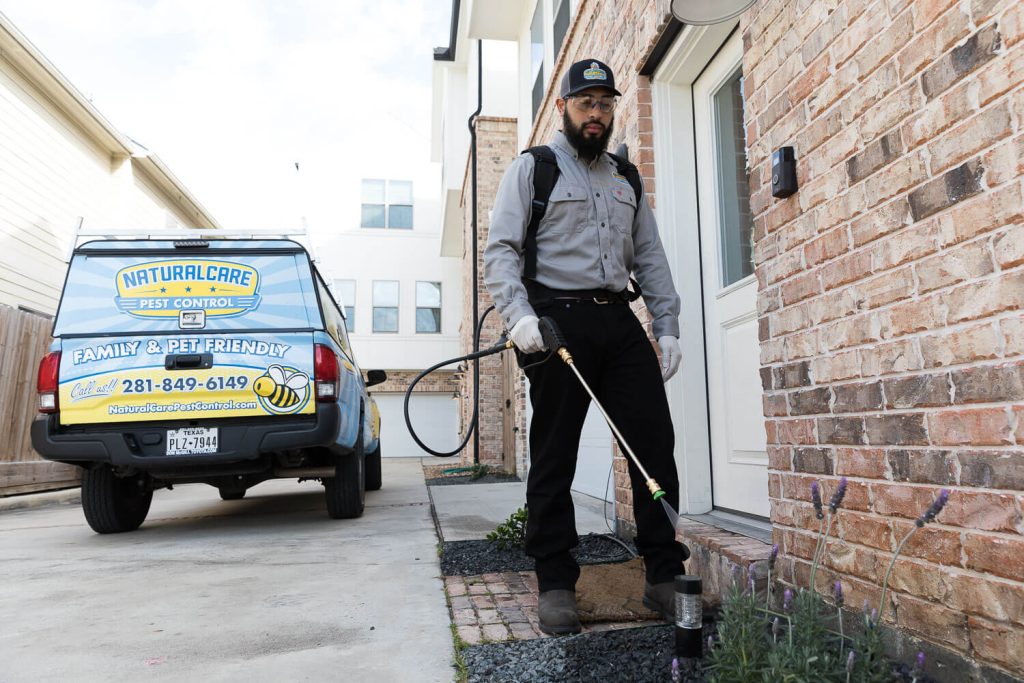
When facing an ant infestation, homeowners are often torn between reaching for a store-bought ant spray or opting for a homemade DIY solution. Each option has its advantages and disadvantages, influenced by factors such as the severity of the infestation, safety concerns, and environmental impact.
Here’s a closer look at how store-bought ant sprays compare with DIY ant sprays:
Store-Bought Ant Spray Advantages
- Potency and Efficacy: Commercial ant sprays are formulated with powerful chemicals designed to kill ants quickly and effectively. They often offer residual effects, continuing to kill ants long after the initial application.
- Targeted Solutions: Many store-bought sprays are tailored for specific types of ants or infestations, providing a targeted approach to pest control.
- Ease of Use: Pre-packaged and ready to use, these sprays offer convenience and can save time for the user.
Store-Bought Ant Spray Disadvantages
- Chemical Exposure: The potent chemicals in these products can pose health risks to humans and pets if not used according to the label instructions.
- Environmental Impact: Some chemical sprays can harm beneficial insects and contribute to environmental pollution.
- Cost: Over time, the cost of repeatedly purchasing commercial ant sprays can add up.
DIY Ant Spray Advantages
- Safety: Homemade sprays often use natural ingredients like vinegar, essential oils, and baking soda, which are safer for humans and pets compared to chemical pesticides.
- Eco-Friendly: Using natural ingredients reduces the environmental footprint, sparing beneficial insects and avoiding chemical runoff.
- Cost-Effectiveness: Many DIY ant sprays can be made with household items, making them a more economical choice over time.
DIY Ant Spray Disadvantages
- Variable Efficacy: The effectiveness of DIY solutions can vary greatly, and they may not be as potent or long-lasting as commercial products, especially in severe infestations.
- Time and Effort: Preparing homemade ant sprays requires time and effort, and frequent reapplication may be necessary to maintain effectiveness.
- Lack of Residual Effect: Natural ingredients typically do not offer the residual killing power of chemical sprays, necessitating more frequent applications.
What Attracts Ants to My Home?
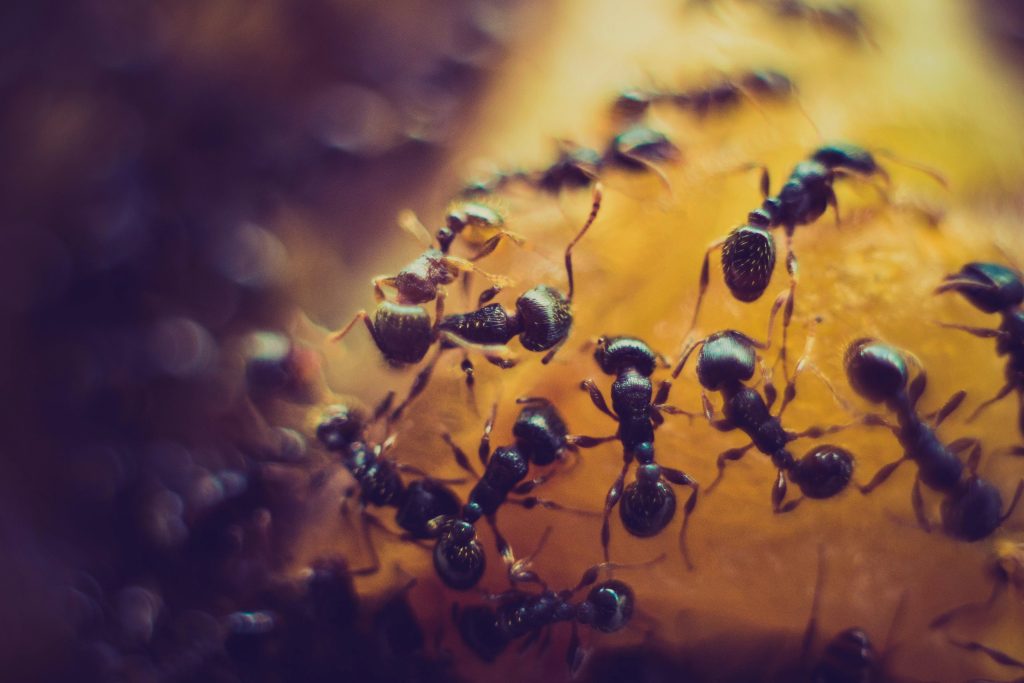
Understanding what draws ants into your home is the first step towards preventing infestations. Typically, ants are in search of three main resources: food, moisture, and shelter. By addressing these attractants, you can significantly reduce the likelihood of ants making your home theirs.
Food
Ants are primarily attracted to easily accessible food sources. This can range from crumbs on the floor, spills that haven’t been cleaned up, pet food left out overnight, to uncovered food in pantries. Sweet substances are particularly attractive to many ant species, but they will also target proteins and fats, making virtually any kind of food spill or residue a potential ant magnet.
Moisture
Just like any living creature, ants need water to survive. Excess moisture or standing water around your home can attract ants. Common sources include leaking pipes, poorly drained areas in or around your home, and condensation around windows and doors.
Shelter
Ants come into homes not just for food and water but also for shelter. They are constantly on the lookout for safe, warm places to nest, especially if the outdoor conditions become too harsh (due to heat, cold, or wet weather). Cracks in walls, foundations, and openings around doors and windows can invite ants inside. Once indoors, they can nest in walls, under floors, or even within damaged or waterlogged wood.
How Do I Keep Ants Out of My House?
Keeping ants out of your house requires a multifaceted approach focused on cleanliness, structural integrity, and environmental management. Here are some detailed preventative maintenance tips to help you safeguard your home against ant invasions:
Regular Cleaning
- Sweep and Vacuum Regularly: Crumbs and food residues are prime targets for ants. Regular sweeping, vacuuming, and mopping can remove potential food sources.
- Clean Eating Areas: Wipe down tables, countertops, and other eating areas immediately after use. Avoid leaving dirty dishes in the sink overnight.
- Manage Pet Food: Feed pets only as much as they can eat at once or use ant-proof pet food dishes. Store pet food in sealed containers and clean up any spills promptly.
Sealing Entry Points
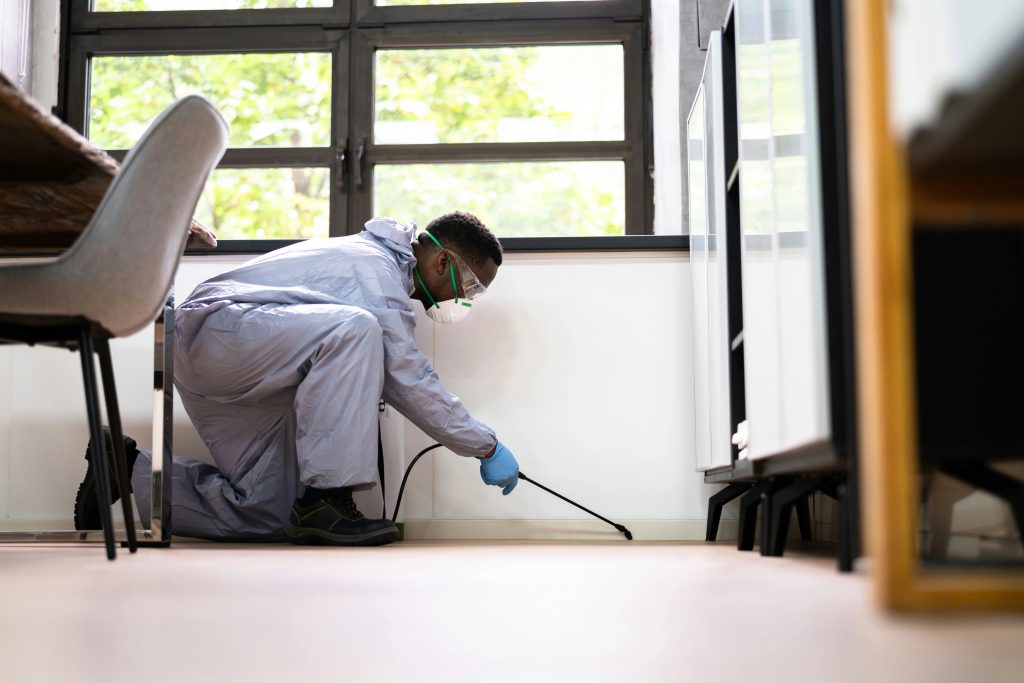
- Seal Cracks and Crevices: Use caulk to seal any cracks in the walls, around windows and doors, and where utility pipes enter your home.
- Repair Screens: Check window and door screens for tears and repair them to prevent ants from entering.
- Install Door Sweeps: Adding door sweeps to exterior doors can block ants and other pests from crawling underneath.
Reducing Moisture
- Fix Leaks: Promptly repair leaking pipes and faucets both indoors and outdoors to eliminate moisture sources that attract ants.
- Improve Drainage: Ensure your home’s exterior has proper drainage to prevent water accumulation near your foundation, which can attract ants.
- Use Dehumidifiers: Dehumidifiers reduce humidity in damp areas of your home, such as basements and crawl spaces.
Additional Tips
- Store Food Properly: Keep food in airtight containers, especially sweets and baking ingredients, which are highly attractive to ants.
- Dispose of Garbage Regularly: Take out the trash regularly and use garbage cans with tight-fitting lids to deter ants.
- Remove Standing Water: Eliminate standing water sources around your home, including trays under houseplants, birdbaths, and clogged gutters.
- Trim Vegetation: Keep bushes, trees, and other vegetation trimmed back from your home to remove natural bridges for ants.
- Use Natural Repellents: Consider natural deterrents like peppermint oil, cinnamon, or vinegar around entry points as an additional preventative measure.
Hiring Professionals for Ant Infestations
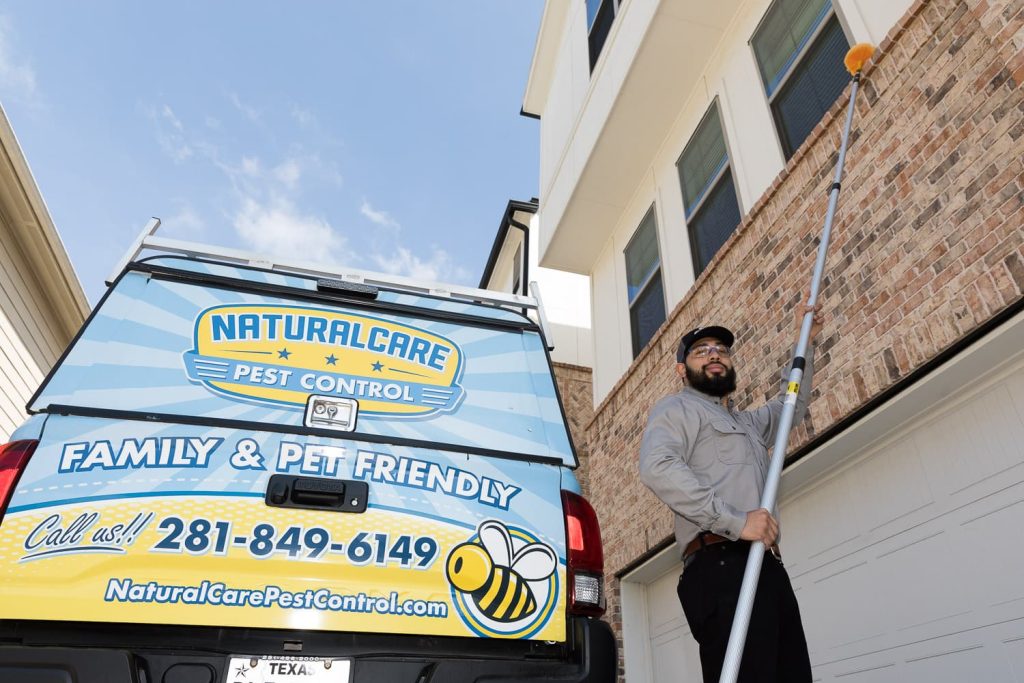
When DIY methods fall short in addressing large or persistent ant infestations, turning to professional pest control services like NaturalCare Pest Control is a wise decision. Our team offers a blend of expertise, experience, and eco-friendly practices to effectively eliminate ants and prevent future invasions.
With a deep understanding of various ant behaviors and infestations, NaturalCare Pest Control creates customized treatment plans that are not only effective but also safe for your family and the environment. Our professionals handle the application of treatments safely, saving you time and effort, and provide peace of mind knowing your home is treated with sustainable methods.
Choosing NaturalCare Pest Control means opting for a service that values customer satisfaction, backed by a commitment to excellence and a 100% service guarantee. By enlisting our help, you ensure a long-term solution to ant problems, allowing you to enjoy a pest-free home with confidence.
Conclusion: Keep Your Family and Pets Safe
In conclusion, effectively managing ant infestations requires a comprehensive approach that includes understanding the attractants to your home, such as food, moisture, and shelter, and implementing preventative measures to address these issues.
While there are various DIY solutions and commercial products available, ranging from non-toxic ant sprays to more potent chemical treatments, the safety and efficacy of these methods can vary.
If you’re dealing with an ant infestation that’s beyond the scope of home remedies, don’t hesitate to contact us at NaturalCare Pest Control. Our team is equipped to provide customized solutions that ensure your home remains pest-free year-round, offering peace of mind and protection for your family and pets.
Frequently Asked Questions
How long does ant spray take to work?
The effectiveness of ant spray can be seen almost immediately with contact sprays, which kill ants on contact. Other sprays designed to be carried back to the nest can take longer, sometimes up to several days, as they need to be ingested by the colony.
Can I use ant spray outdoors?
Yes, there are specific ant sprays formulated for outdoor use that can help manage ant populations in gardens, lawns, and around the exterior of your home. Outdoor ant sprays are usually more robust and weather-resistant to provide lasting protection.
How often should I apply ant spray?
The frequency of application depends on the specific product and the severity of the ant infestation. Some sprays offer long-lasting protection and might only need to be applied once a season, while others may require more frequent applications. Always check the product label for the manufacturer’s recommended usage guidelines.
What should I do if ant spray does not resolve my ant problem?
If ant spray alone does not eliminate your ant infestation, it may be necessary to combine treatments such as baits and granules or to consider professional pest control services. Persistent or large-scale infestations often require a more comprehensive approach to ensure all ants, including the queen and colony, are effectively eradicated.

